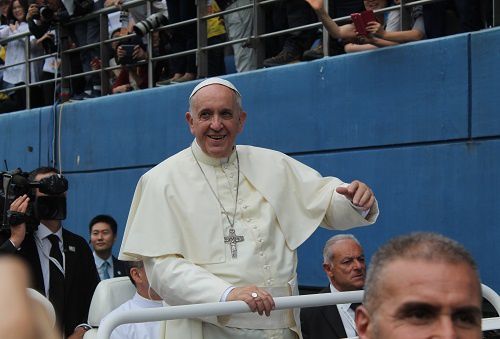In his homily on Tuesday Pope Francis said that Jesus’ service to others has no boundaries, and warned of those who put limits on how much they give because they are lazy, or want to control the situation. “His path was this attitude of service; He is a servant. He presents himself as a servant, the one who came to serve and not to be served,” the Pope told mass-goers gathered in the chapel of the Vatican’s Saint Martha guesthouse on Nov. 11. But “Laziness distances us from work and leads us to this ease, this selfishness. Many Christians are like this — they are good, they go to Mass, but only serve to a certain point.” The Roman Pontiff centered his reflections on the day’s Gospel reading from the 17th chapter of Luke, in which Jesus tells the parable of a servant who, after a long day of work, serves his master dinner and responds that he is unworthy, and merely did his duty. While there are some who would tell this servant “to go to his trade union for some advice on how to deal with a boss like that,” what Jesus is telling us through the parable is that “service is total,” the Pope explained. Through his attitude of service Jesus shows his apostles what the path looks like for those who have received faith, the Bishop of Rome noted, saying that this faith can “do wonders” on the path of service. A Christian who receives the gift of faith in baptism but doesn’t use it to go forward on a path of service becomes a Christian “without strength, without fertility,” he said, explaining that because these people live only for themselves, they turn out sad and waste the gifts of the Lord. Pope Francis reiterated that service must be total, saying that we can’t serve two masters, but must choose between serving God and serving riches. One attitude that keeps us from giving ourselves completely in service is laziness, he said, which makes our hearts lukewarm and comfortable. “When I say service, I mean everything: service to God in worship, in prayer, in praise, service to others,” the Pope explained, saying that rather than serving only when we have to, we should imitate Jesus, who gives until the very end. “Jesus is strong in this: So should it be with you. When you have done all you have been commanded, say, ‘We are unprofitable servants.’ (This is) gratuitous service — service that asks for nothing in return.” Another attitude that distances us from this type of service is when we want to “take over control of the situation,” the pontiff noted, and pointed out how the disciples themselves did this when they tried to keep the crowds away from Jesus. They tried to keep people from approaching Jesus so that they could “be at ease,” he said, and by doing this they attempted to take control of the Lord’s time and power because “they wanted Him all for their little group.” Rather than being a community dedicated to serving others, they were turning it into a “power structure,” the Pope observed, explaining that the same dynamic can be seen in the gospel when James and John discuss which of them is greater. When their mother goes to Jesus and asks that one sit on his right and one on this left, she is really asking “for one of her sons to be Prime Minister and the other minister of the economy, with all the power in hand,” he said. Even today this happens in our Christian communities, the Roman Pontiff observed, explaining that it is a great temptation, and that instead of seeking our own self-advancement, we must serve in hope and humility, which is the source of Christian joy. “In life we have to struggle so much against the temptations that try to distance us from this attitude of service,” the Pope explained. “Laziness leads to ease: half-hearted service, (to) taking control of the situation, and to becoming master instead of servant, which leads to arrogance, pride, to treating people badly, to feeling important 'because I am a Christian, I have salvation', and so many things like this.” Pope Francis concluded his reflections saying that the Lord gives us two key graces in fighting these temptations, the first of which is the humility of service with allows us to echo the words of the Gospel’s servant, who calls himself “unprofitable,” but who serves until the very end. The second, he said, is the grace of hope while we are waiting for the end of time, when the Lord will return to us.

